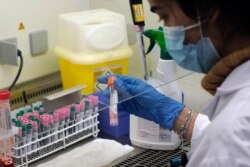As the global COVID-19 death toll approaches 1 million, it is possible the figure could double before a viable vaccine becomes widely available, the World Health Organization said Friday.
WHO Emergency Program Director Mike Ryan, noting that the current COVID-19 death toll stands at more than 980,000 deaths worldwide in less than nine months, said reaching 2 million deaths is "certainly unimaginable." But, he added, it's "not impossible" given all that would be involved in getting a vaccine ready and distributed.
Ryan said countries should do all they can to keep the death toll down.
"Remember, we have things we can do now to drive transmission down and drive down the number of deaths," he said.
Meanwhile, the agency expressed concern about the trend of rising cases in many European countries. WHO's technical lead for COVID-19, Maria Van Kerkhove, said that part of these increased numbers is due to better detection of the virus.
However, she added, "What is worrying to us is an increase in hospitalizations and an increase in bed occupancy for hospitalizations and also in ICUs [intensive care units]."
Kerkhove warned that this is a concern because the region is about to enter its influenza season, and "these trends are heading in the wrong direction." She said, however, that most nations are in a much better situation than they were a few months ago in terms of addressing the virus, reducing transmissions and saving lives.
WHO Director-General Tedros Adhanom Ghebreyesus also released a detailed plan for its Access to COVID-19 Tools Accelerator (ACT) program, designed to develop treatments and vaccines and make them available globally. Tedros says the goal of the program is to distribute 2 billion doses of any viable vaccine worldwide by the end of next year.
He said ACT still needs $35 billion in funding, and he appealed to nations for their support. Tedros said that while that is a lot of money, "in the context of arresting a global pandemic and supporting the global economic recovery, it's a bargain."
He said $35 billon is less than 1 percent of what G-20 nations have already committed to their domestic economic stimulus packages.






